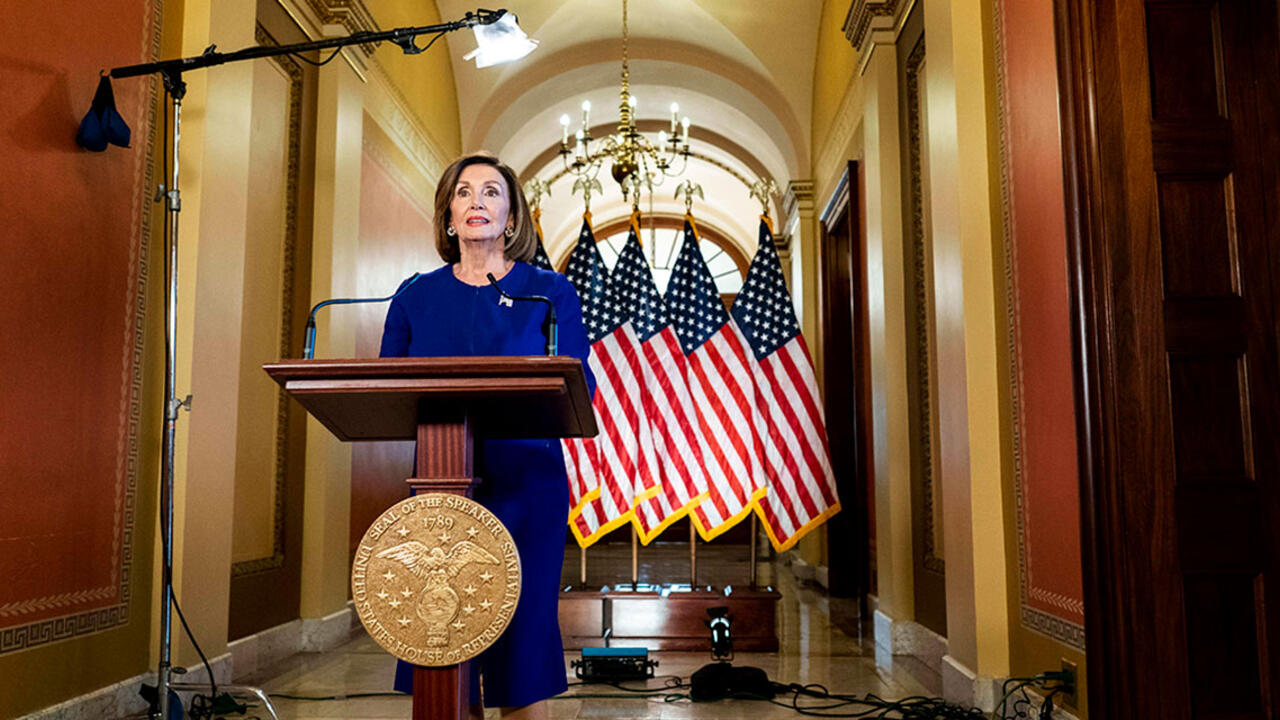How a Phone Call Led to an Impeachment Inquiry

In mid-September, reports that a whistleblower had filed a complaint against the President of the United States were revealed in the media. The House of Representatives issued a subpoena for the full report, but the Director of National Intelligence refused to comply. Shortly after, reporting from The Washington Post, The New York Times, and The Wall Street Journal revealed that the report had to do with a call between President Donald Trump and Ukrainian President Volodymyr Zelensky in July. As details were revealed calls for impeachment began to arise, centered around the issue that President Trump tried to influence Zelensky for political gain. On September 24, Speaker of the House Nancy Pelosi announced that the House would begin a formal impeachment inquiry.
We asked Igor Logvinenko and Maneesh Arora, both assistant professors of political science at Wellesley, to explain key points about these recent events.
Three things you need to know about the Ukrainian call controversy from Igor Logvinenko:
- The whistleblower filed a complaint with Michael Atkinson, the Intelligence Community inspector general, suggesting that in a July 25 phone call, President Trump pressured current Ukrainian President Volodymyr Zelensky to cooperate with his attorney Rudy Giuliani to investigate Hunter Biden, the son of former vice president and a leading candidate for the Democratic nomination in the 2020 election against Trump. The White House had also delayed the release of foreign aid to Ukraine (previously authorized by Congress) until a few days ago, likely after it became clear that the details of the complaint would become public.
- Unfortunately, what Hunter Biden was doing has become common practice for many Western leaders—something we have come to accept as the normal state of affairs. Gerhard Schröder, the former German chancellor serves on the boards of the largest Russian oil and gas companies; Tony Blair, the former British prime minister, advised the autocratic government of Kazakhstan, earning millions of pounds; Lord David Owen, former British foreign secretary was hired by the Yukos oil company in 2002-05, when it was the largest private company in Russia. Leading European banks, like Deutsche Bank and Danske Bank, were caught in money-laundering scandals involving Russia. My specialty is the former Soviet Union, but the examples of this abound from the London Stock Exchange changing its corporate governance standards to accommodate the listing of Saudi Aramco, to the American banks being implicated in laundering money of the Colombian cartels.
- The Ukrainian press is following the visit of President Zelensky to the UN summit, and while there, Zelensky has publicly denied that he was being pressured by Trump, saying that the only person who can pressure him to do anything is his 6-year-old son.
Three things we need to know about the impeachment inquiry from Maneesh Arora:
- As many scholars have argued, impeachment is more of a political process than a legal one. There is simply no nonpartisan or apolitical avenue to evaluate potential misconduct of a president. For Pelosi to move forward with the impeachment inquiry, she had to believe that there was enough support among Democratic lawmakers and that the American people would understand why impeachment is so important. In the days after the whistleblower allegations against President Trump were reported, many Democratic lawmakers, including centrists and those in vulnerable districts who had previously been wary of impeachment proceedings, came out in support of an impeachment inquiry. Moreover, the narrative of impeachment has become much simpler—the president used his position of power to pressure the leader of a foreign government to investigate his political opponent and even used taxpayer money as leverage. Though impeachment has not been popular among voters up until this point, that is likely to change now that voters will be receiving a consistent message from Democratic lawmakers.
- The impeachment inquiry has several potential implications. One, impeachment, corruption, and abuse of power will be a major focus of the 2020 election and will dominate the political landscape for at least the next year. Similar to the Mueller investigation, it will likely be a major distraction to President Trump’s political agenda. Two, the process may further erode public trust in government and deepen partisan chasms in an already hyper-polarized environment. Three, it sets a precedent that Congress is willing to use its strongest check on executive power to hold the president accountable for alleged abuses of power and violations of the public trust.
- There are clear pros and cons for the Democratic Party to opening the impeachment inquiry. It may be viewed as an overreach of power or a political stunt (or, to use the president’s preferred language, a “witch hunt”). Many voters may believe that President Trump’s fate should be left to the voters in November 2020 rather than decided by Congress. Moreover, given Trump’s current unpopularity, it may provide a much-needed boost for his chances of re-election. On the other hand, it provides Democrats an opportunity to put the spotlight on Trump’s alleged abuses of power and corruption, and it forces Trump and Giuliani, two people with tendencies toward public gaffes, to have to publicly defend their actions.
- There are also clear pros and cons for the American public and our Democratic institutions. As I stated above, the impeachment inquiry may further erode trust in government and deepen partisan animosity. But the inquiry also allows Congress to do what our nation’s founders intended them to do—hold elected officials accountable for abusing their positions of power and violating the public trust.
Photo: Speaker of the House Nancy Pelosi delivers an address on Tuesday September 24, 2019, from Capitol Hill, formally launching an impeachment inquiry into President Donald Trump.



